#latin: vocab
Text
Silvio hates your wedding customs.
... not all the customs. Just one:
The DOLLAR DANCE

Picture it:
Silvio and Emma emerge from the wedding ceremony and go straight to the reception. It's all taking place in Rhodolite, because she told asked him.
That means Rhodolite customs are taking place.
When the emcee announces the "dollar dance", Silvio is at the open bar getting his drink refilled, so he doesn't take much notice.
Until men begin lining up to dance with the bride. His bride.
Silvio stares in disgust as the first man has the gall to slip paper money into her sleeve at the wrist. They begin to waltz.
"What. The. Fu--?? Hold my drink. Nah, on second thought --" He slams the liquor back, crassly wipes his lips, and stalks towards the dance floor.
Now the next man in line is putting a rolled-up bill under Emma's hem at the top of her shoulder.
$$$$$$$$$$$$$$
A few tumbled chairs, many foreign swear words, and one broken wrist later, Emma is explaining at the top-of-lungs what this wedding custom is all about.
Silvio matches her volume and stubbornness in refuting the fact that the custom is "stupid" and that she should know "no one gets to throw money at you except me".
$$$$$$$$$$$$$$
Amid the quietly stunned guests , Clavis gleefully puts a wad of cash in Nokto's palm.
Luke: " Why're you so happy to be forking over cash? Didn't you just loose the bet that Silvio would go ballistic over the dollar dance?"
Clavis: "Ah, yes, yes. I took that bet gladly, and raised the ante so high that Nokto couldn't refuse. I knew if this much money was on the line, he'd make certain the dollar dance would be at the reception."
Nokto: "A pleasure doing business with you."
Luke: *confused baby bear*
Clavis: *shrugs, guffaws* A nice, normal wedding dance is boring. Boring, boring, boring. The bribe -- er, I mean friendly wager -- was a way to ensure the occasion would hold some excitement!
#I always imagine Silvio having the absolute worst most salacious curse words in his vocab because of his merchant/pirate friends#mostly Italian and Greek#and lots of Portuguese and Spanish#probably some French#he sprinkles them in his conversations like raisins on top of oatmeal#ikepri silvio#he's definitely some combination of Mediterranean and Latin in my headcanon#ikemen prince silvio#silvio ricci
25 notes
·
View notes
Text
Conversational Latin:
Some expressions and sentences for latin conversation.
Hi- Salve
Goodbye- Vale!
How are you?- Quid Agis?
Shut up!- Obsera os tuum!
I'm fine (Answer to "How are you")- Valeo
Thank you- Gratias
Do you speak Latin?- Loquerisne Latine?
Just a little- Modo paululus.
By the way- Obiter
Starting today- Ex hoc die
What does it mean?- Quid hoc sibi vult?
What mean is (Correcting a misunderstood)- At enim
Thanks a lot- Multum te amo
Wait a minute please- Mane Dum Quaeso
What's up?- Quid rei est?
To tell you the truth- Ut verum loquar
I don't quite understand- Non satis intellego
I don't think so- Ego non puto
What do you think?- Quid Censes?
I like this- Hoc mihi placet
That's right- Sic est
In short- In summa
Right now- Nunciam
From time to time- Subinde
At this point (in time) - Hoc loco
After all- Re vera
Yesterday- Heri
Tomorrow- Cras
Sooner or later- Serius ocius
Every night- Per Singulas Noctes
Every day- Cotidie
Tonight- Hac Nocte
#latin studyblr#latin language#lingua latina#latim#studying languages#study tips#latina#vocabulary#latin vocabulary#learn latin#langblr#langbr#vocab list#latin vocab
51 notes
·
View notes
Text
hello everyone! Thought id share how to say goodbye in russian since i could think of a few ways, here they are ranging fron most to least casual!
Покá - opposite of привéт, super casual and means "bye"! you would normally say this to a friend, close family member or someone younger than you. i can't think of the origin but the word has a second meaning, which is "for now/while".
До скóрого - (lit. until soon), somewhere between пока and до встречи in terms of formality, but meaning is closest to the next point.
До встрéчи - literally translates to "until (our next) meeting", a bit more formal than покá, but unlike it clearly implies that you will meet the person again at some point later, so id say its closer "See you" / "Until next time".
There is also a second version, "До нóвых встреч" (lit. until new meetings, meaning is the same, ive heard it used most often on tv programmes and when adressing an audience) and a more 'urgent' version: До скóрых встреч (Until our next meetings [which will happen soon]).
До свидáния - same literal meaning as до встречи but does not necessarily imply youre going to see the person again. Im not sure about the origins of this one but it likely has to do with the somewhat obsolete verb свúдиться - to meet/encounter someone, lit. to see each other.
Всегó дóброго/хорóшего - lit. means "(I wish you) All the best." You can use this when leaving a work meeting, finishing a phone call respectfully or with a customer. It can be used outside of professional situations but from my experience that's less common. Here, дóброе is used in its second meaning (first being "kind/pleasant [person]"), which is "good/nice".
Прощáй(те) - means farewell. a permanent goodbye, you will likely never see the people you say this to again. Прощай is the slightly more casual version while прощайте is more formal or refers to a group. Interesting fact: it wasnt formed from простúть (to forgive) but instead простúться (to bid farewell). the second word is also somewhat obsolete.
hope this was interesting! let me know what topics youd like me to talk about next and ask questions if you have them!
#i couldn't wait anymore lol#russian langblr#russian language#langblr#russian vocab#russian vocabulary#idk what else to tag this as help#he was forced to use latin letters to show stressed vowels in cyrillic when he was 16 years old /ref
166 notes
·
View notes
Text
What is Magical Realism?
Magical realism is most commonly known as a literary genre that blurs the lines between the mundane and the extraordinary. Although its origins may be disputed, there's no doubt that it's the genre people most associate with the Caribbean and Latin America. During the age of (re)discovery and conquest of the New World in the 1400s, Europeans wrote and depicted much about life in the Americas, that seemed to them especially strange and exotic.
These exotic and reductive descriptions of the tropical regions in particular were reinforced during colonization and eventually came to define the region and the people who lived there for many centuries. With the arrival of magical realism in the literary boom of the 60s, the genre appeared in the scene as a unique chance for a reclamation that would return the narrative of the region back into the rightful hands of its inhabitants.
While today you can find many articles on the topic, one important aspect that many tend to miss is that while extraordinary experiences in the day to day are treated as normal by the characters in these stories, what's considered normal of daily life in our world is put into question by the reader. For this reason, magical realism is also a popular way to question politics and address other social issues. This continues to be one of its most popular uses in a world where journalists aren't always able to publish their opinions without getting into trouble with the state, which is still a huge problem in countries like Guatemala, Mexico and many more.
#magical realism#vocab#vocabulario#vocabulary#caribbean art#realismo magico#realismo mágico#realismo fantastico#realismo fantástico#latin american art#caribbean literature#art history#art history blog#colonization#colonialismo#latin american and caribbean studies#latin american studies#caribbean studies
6 notes
·
View notes
Text
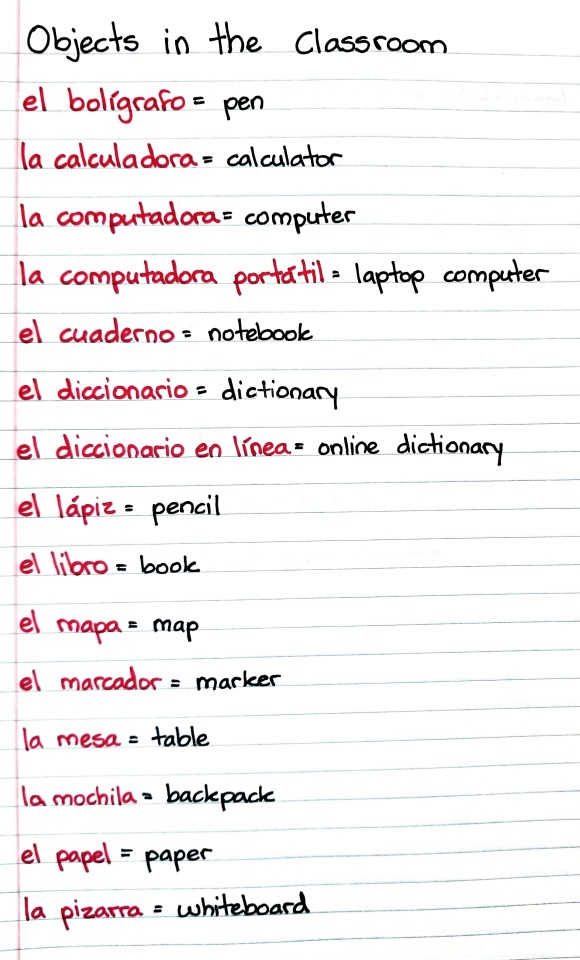
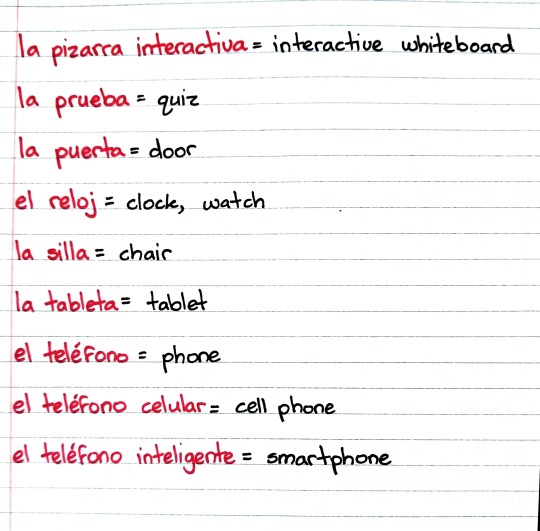
Patreon
#studyblr#notes#langblr#language#spanish#spanish studyblr#spanish notes#spanish langblr#spanish language#spanish learning#learning spanish#romance languages#latin languages#latin#vocab#vocabulary#spanish vocab#spanish vocabulary#spanish vocab list#spanish vocabulary list#vocab list#vocabulary list#spanish words#words in spanish#classroom vocabulary in spanish#spanish classroom vocabulary
13 notes
·
View notes
Text
Science side of tumblr, why do I genuinely find Latin fun, while Ancient Greek makes me want to commit trespass against the person?
#it’s not the letters#im good with the letters#I have done Latin for a couple months longer so could be that?#it just won’t click#im genuinely reading the res gestae divi augusti as a treat for practicing my Greek vocab#aka the most boring text ever#I could at least do some Ovid#it’s fucking dire
5 notes
·
View notes
Text
my favourite thing to lie about is sometimes i will just tell people i’m bilingual. like if you aren’t fluent but know a language that isn’t very commonly spoken, there’s a 90% chance that you will be the only person in the room with working knowledge of that language. make a grammar mistake? who’s gonna correct you? this never fails to work and makes me laugh every time
#it’s so fun and so easy#personally i do this with hebrew#biblical AND modern#even though i’m terrible at both#because i have good knowledge of basic vocab and full knowledge of the hebrew alphabet#but if you’re in the uk were dumb as rocks you could use anything#like any languages that don’t have roots in latin would work#i’m trying to get my friend to teach me bengali to a good enough standard that i can do this with bengali#bc realistically i’m bad at languages#i will probably never be fluent in bengali#but if she can teach me the bare bones of the language and a few phrases i can fake it till i make it
14 notes
·
View notes
Text
daily wwhistlepaw until gre becomes PoV day 1054

went to a doctor today about my painful right hand, it might probably be tendonitis, so I have to use this hand sparingly (and my other has been unusable for four years, so i'm without properly usable hands right now :/). I'll try to keep the usage to a minimum, and keep it for a Small whis every day, but you'll have to excuse my even more lacking updates as I try to keep going until the pain's mostly gone
#warrior cats#whistlepaw#windclan#medicine cat apprentice#the problem being i'm at university and I need to study a lot and i study by writing#and I have a monstrous amount of vocab still waiting for me (about 200 words extra for latin and a good amount of pages for greek)#plus all the other things I need to write and the notes I techniclly take in class#i'm kindof stuck here right now :/
7 notes
·
View notes
Text
If you’re a demonic you either have to frequently use British vocabulary and/or know Latin (or some other ancient/dead language)
You have no choice.
#/this is a joke#I repeat a joke#frankly nothing wrong with it tho#bc like my vocab has morphed over the years to include a lot of British phrases and spelling#and I didn’t spend four years of high school learning Latin for nothing#general tags:#demonkin#demonic#nonhuman#alterhuman#otherkin#demon
15 notes
·
View notes
Text
Fics are going on the bottom of the to do list again, school is kicking my ass
#at least i have 4 free days to get everything done#one english text#russian homework plus english vocab a lot of shit in biology and history (my beloved (probably gonna start studying the day before))#plus latin (im behind on vocab again)#jonah's daily woes
2 notes
·
View notes
Text
UPDATE I FINISHED MY 3 DAY LATE LIVY ESSAY AND ITS NOT EVEN AS BAD AS I THOUGHT IT WAS GONNA BE
#i have like 7 pages of latin vocab + 5 pages of greek grammar to learn for tomorrow but whatever its ok i have that every week. i can fail#pip squeaks#<- you dont want to know how long it took me to write that tag btw. im going to sleep now
4 notes
·
View notes
Text
différend : nm. désaccord causé par un opposition d'opinions ou d'intérêts entre des personnes.
ex : Le différend politique entre sa mère et son père amplifie les tensions au sein de la famille.
5/10
disagreement : the act, state or fact of disagreement; a difference of opinion.
Don't confuse it with the adjective différent!
Historically, it's a variation of différent, which comes from the verb différer, which was itself borrowed from the Latin form differens.
#i love etymology so much man#can you tell yet?#it's so underrated#french isn't that interesting because it's all greek or latin with some english sprinkles#germanic languages tend to be much more interesting#no i swear#i'm omw to lose my mind because of language studies#anyways tag time!#différend#french#french vocab#main#french vocabulary#french words#daily french word#having a blondie moment she's so much fun to listen to#have a good day
3 notes
·
View notes
Text
Using or avoiding foreign words
Terms from Latin or French [F] – Meaning or alternative term
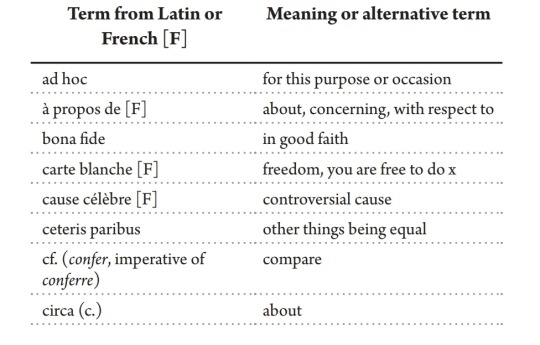
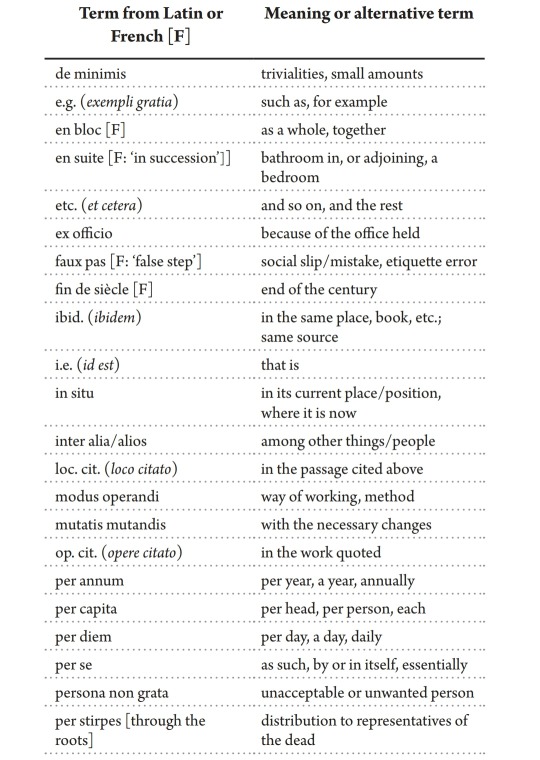
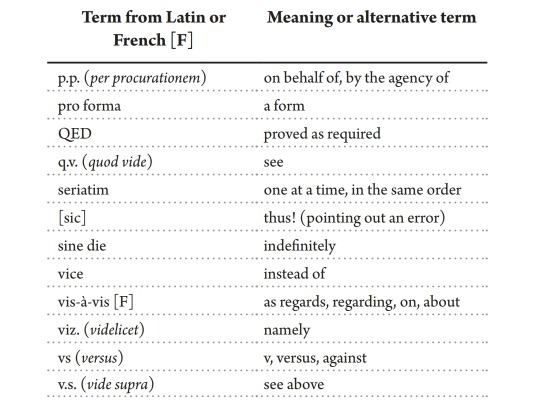
Reference – Oxford Guide to Plain English (Fifth Edition) by Martin Cutts
#plain english lexicon#books & libraries#basics#words#tumblr polls#poll#language poll#foreign words#latin and french phrase#english grammar#english#learning#polls#language#book references#spelling#english language#vocab#vocabulary#writing#language learning#latin and french terms#terms
12 notes
·
View notes
Text
¿Qué es el realismo mágico?
El realismo mágico es más conocido como un género literario que se mezcla las líneas entre la realidad y lo fantástico. Aunque sus origines se disputan, no cabe duda que es el género que la gente más se identifica con la región caribeña y latinoamericana. Durante el (re)descubrimiento y la conquista del nuevo mundo en los años 1400, los europeos escribían y dibujaban mucho sobre la vida en las Américas que parecían a ellos en especial extraño y exótica.
Estas descripciones exóticas y reductoras de la región tropical en particular se refortalecían durante la colonización y llegaban a definir la región y quienes lo habitan por muchos siglos. Con la llegada del realismo mágico en el boom literario durante los años 60, el género apareció en la escena como un chance único para una reconquista que regresará la narrativa de la región en manos de sus habitantes.
Mientras hoy en día uno se puede encontrar muchos artículos sobre la tema, un detalle que muchos se pierden es que mientras experiencias mágicos del día a día se trata de una forma normal por los caracteres en sus libros, lo normal de la vida ordinaria en nuestro mundo se pone en cuestión por el lector. Por esa razón, el realismo mágico es también una forma muy popular de cuestionar la policía y tocar otras temas sociales. Sigue siendo uno de sus usos más claves en un mundo donde periodistas no siempre pueden publicar sus opiniones sin caerse en problemas con el estado, que todavía es una problema muy grande en países como Guatemala, México y muchos más.
#queria escribir sobre la tema por muchos años#xq siento q muchos se pierden la pista cuando hablan sobre el genero#realismo magico#realismo mágico#magical realism#caribbean art#latin american art#arte latino#arte latinoamericano#aracataca colombia#realismo fantastico#realismo fantástico#lo real maravilloso#vocab#vocabulario#vocabulary#literatura latinoamericana#literatura latina#caribbean literature
6 notes
·
View notes
Text
Earth Day (French)
eau = water
propre = clean
vert = green
terre = earth
ordures = trash
recycler = recycle
protéger = protect
pollution = pollution
environnement = environment
énergie = energy
conserver = conserve
écologique = ecological
.
Patreon
#studyblr#notes#langblr#language#french#french langblr#french language#french notes#french studyblr#french vocab#french vocabulary#vocab#vocabulary#french words#words in french#romance languages#latin languages#french learning#learning french
18 notes
·
View notes
Text
everything i write for fun is made up of 1.) jargon. 2.) vocabulary words from either english or latin 3.) esoteric phrases and idioms…
#the latin vocab is less obvious because it’s not. in latin. but sometimes i only know english words because of their latin words.#samael speaks
8 notes
·
View notes